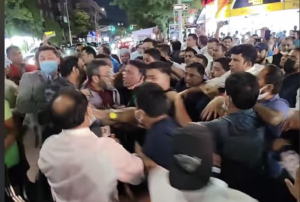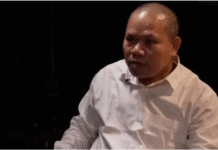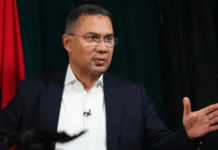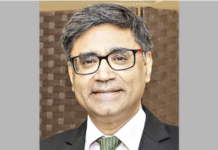By Sharif As-Saber

27 September 2021
Recent scene of brawl between two Bangladeshi rival political groups in Jackson Heights, New York
The recent brawls between two rival groups of overseas Bangladeshis at several political gatherings including at Jackson Heights, New York have drawn attention and generated significant debate among politicians, intelligentsia, and ordinary people from home and abroad. The series of skirmishes created by the rival political groups resulted in chaos, traffic congestions and roadblocks while disrupting the normal life in the city’s crowded Jackson Heights area. It outraged ordinary New Yorkers who expressed their dismay, disgust and concerns that threw Bangladesh into a bad light and tarnished its image and reputation.
The number of Bangladeshis living overseas has been on the rise in recent years. More than 13 million Bangladeshis are believed to be living abroad of which more than 2.5 million are permanently living across more than 160 countries around the world. Most of the Bangladeshis permanently living in the industrialised, developed countries are concentrated in, but not limited to, the UK, USA, Italy, Japan, Australia and Canada. The UK is the home of the largest Bangladeshi diaspora, followed by the USA.
While most of these people have been living peacefully, integrating themselves into the local norms and lifestyle and engaged in various jobs and activities, a handful of them form small groups and indulge in questionable activities, not considered appropriate nor decent. Unfortunately, these groups of overseas Bangladeshis who seem to carry political baggage from back home are responsible for staging unnecessary rallies and counter rallies, chanting slogans against each other, and engaging at times in physical brawls.
However, such rivalries and clashes are not new. This small percentage of overseas Bangladeshis indulge in this sort of seemingly culpable and irresponsible activities who import the divisive and often hateful Bangladeshi political culture and norms into their host countries. They engage in evidently pointless and destructive conflicts including regular exchange of improper and rude words against each other (including calling names) both in public and via social media. They also lobby foreign governments and international agencies to get their support in glorifying their own party or political ideology while undermining or demonising their political opposition. But the worst of it becomes visible when such rivalries end up in fisty-cuffs in the streets for everyone to see.
Despite the unrelenting Covid19 onslaught around the world, these over enthusiastic and outlandish overseas Bangladeshi supporters of mainly two major Bangladeshi political parties have remained undeterred in staging yet another unpleasant string of street rallies in the planet’s most important megacity, New York. It is, however, not uncommon to see similar incidents taking place between rival Bangladeshi groups in other parts of the world. These are usually triggered by visits of key Bangladeshi political figures such as the head of state, leader of the opposition or any other politically important or controversial person.
Unfortunately, in New York, these unpleasant incidents have been taking place as an annual event. Approximately 100,000 Bangladeshis live in this megacity of which only few hundred participate in such an event every year in September when the Bangladeshi Head of State visits New York to attend the annual UN General Assembly session. New York residents are, however, not happy about this annual event and a large group of New Yorkers lodge complaints to the New York Police Department every year to stop such public nuisances.
It is important to note, this year, 193 members of the United Nations are attending the General Assembly session along with the Holy See and Palestine as observer states. Bangladeshis constitute the only diaspora population living in New York who engage in such brawls involving the visit of their Head of State. Immigrants or settlers from no other country participate in this sort of unpleasant activities – had they done so, New York would have become the rowdiest place on earth, especially in the month of September!
London is another of such hotspots that witnesses violent clashes among rival overseas Bangladeshi groups every now and then. As one of the senior most Bangladeshi political leaders is living in exile in London, campaigns and rallies are frequently organised by both his supporters and the opposition. The long-standing nature of the problem has recently been shared by a Bangladeshi academic who visited London in 1989. During his visit, he witnessed the chaos created involving the official London tour by the then Head of State of Bangladesh, General Ershad. The mob followed him all the way from Heathrow airport to 10 Downing Street. They were carrying black flags and chanting all sorts of bad words throughout the entire route. They also followed him to the Brick Lane Mosque during the Juma prayer. British police with the Dog Squad had to intervene and enter the mosque premises to protect the Bangladeshi President. At that time, Abdul Gaffar Chowdhury, a renowned Bangladeshi intellectual permanently living in London, staged a drama titled ‘Ershad-Morium Kechcha’ (Story about the romantic relationship between Ershad and Mary) in protest of the President’s visit. As a consequence, violence erupted in many parts of London. Nazrul Islam Basan, who acted as Ershad in the play was beaten up by Ershad supporters and the subsequent shows were cancelled by the authority as a result.
Protests and counter protests were also held in these two cities during the visits of other Bangladeshi political dignitaries including PM Hasina, the former President Ziaur Rahman, former PM Khaleda Zia and the former Head of the Caretaker government Fakhruddin Ahmed. Similar incidents took place in many other cities around the world as well, but not in the same scale or frequency.
Question remains, why do overseas Bangladeshis participate in such activities which are seen by others as irrational, ludicrous and unacceptable while people from other countries of origin do not get involved in this kind of activities? Although I do not have any straightforward answer to this pertinent albeit difficult question, several assumptions could be made:
First, in Bangladesh, there are a significant number of people who never stop supporting the political party they have been supporting since they were first exposed to local politics or political campaigns. They remain blindfolded in their support and do not see anything wrong in whatever their party and its leaders do. They stay unmoved even when these leaders take wrongful decisions and violate the rule of law. When many of their political masters change their party allegiance and switch from one party to another, these supporters remain dedicated to their own party. Many of these supporters continue to remain equally loyal to their respective party and party leaders even after they leave the country for good. They also take with them the divisive and chaotic Bangladeshi political culture which either advertently or inadvertently becomes exposed in their behaviour. They change their addresses but not their mindset!
Second, a good number of political leaders in Bangladesh suffer from inferiority complex being fully aware of their poor quality, corruption mindedness, low popularity and craving for power. The post-independence Bangladesh had witnessed a long list of leaders who suffered from such shortcomings. These leaders often look for some sort of solace through public shows of support by their dedicated groups of supporters. Although these supporter groups usually confine the leaders within a false popularity trap, the leaders still boast on such support and encourage their followers to organise rallies to glorify them or to undermine their oppositions. The leaders also expect and encourage such shows of support in overseas locations during their visits. Bangladeshi diplomats also facilitate or encourage such rallies or demonstrations and spend public money to get some blessings or rewards from the visiting leaders. They are often instructed from the country’s foreign office to organise or support these activities.
Third, another group of supporters rally their allegiance to the leaders which constitutes the direct beneficiaries from the leader or the party. They might have been benefitted in the past, enjoying some benefits now or expecting to get some benefits in the future. Many of them are fair weather birds and only stick to the leader when in power. While in overseas, they continue behaving in the same way as they did in the past back home. In return, these supporters are given rewards in the form of government contracts or jobs for themselves or their relatives back in Bangladesh. For some, it could just be an opportunity to take a selfie with the leader to show off or to receive official invitations from the local embassy or consulate to attend various functions.
Fourth, there are a group of people living in the so-called ‘Begum Paras”(colloquial term used to refer to villages where the wives of the new rich live) across the various overseas locations including New York and London who have allegedly amassed a lot of money through corrupt means and would like to remain in the good book of the government so that they are not chased up or harassed by the government authority for the corruption they committed or the black money they have. They often fund and join such rallies as and when necessary to register their support.
At the end, a question could be raised, if there is a change of government in Bangladesh, will the dynamics of this rivalry change as a result? The straight answer would be, ‘No’! Unfortunately, these undesirable incidents will keep going on in the same way and with the same outlandishness. Only change, however, would be evident, i.e., the swapping of rival standings where the existing pro-government supporters will swap spots and take an anti-government stand and vice versa, resulting in the continuation of a dismaying vicious circle!
Many might try to explain this behaviour from a cultural, idiosyncratic lens as the traditional Bengalis (also flippantly called as ‘Bangals’) are said to be fond of intimidating others by staging crude and hollow soap operas. Renowned film director, Mrinal Sen, in one of his famous movie, ‘Bhuvan Shome’ termed them as “Ajib Bangal’ meaning “strange Bengalis” while referring to the Naxalite movement led by Bengali revolutionary, Charu Majumdar. Apparently, a large proportion of Bengalis easily become emotional who might do things on the spur of the moment disregarding the circumstances, overlooking the fact, ignoring any shame, neglecting self-respect, promoting self-interests and, finally, igniting violence! Considering all these distinctive attributes, Rabindranath once lamented, ‘সাত কোটি বাঙালিরে হে মুগ্ধ জননী, রেখেছ বাঙালি করে মানুষ করনি’, i.e., ‘Oh my fascinated mother, you have left seven crore Bengalis as mere Bengalis without making them proper human beings!’.
———-
Author: Dr Sharif As-Saber is the President and CEO, Governance, Administration and Innovation Network, Australia










If you were not an Awami League suporter in 1971, you are person without conscious and if were a supporter and continued to remain a supporter of Awami League after 1971, you are a person without conscious!